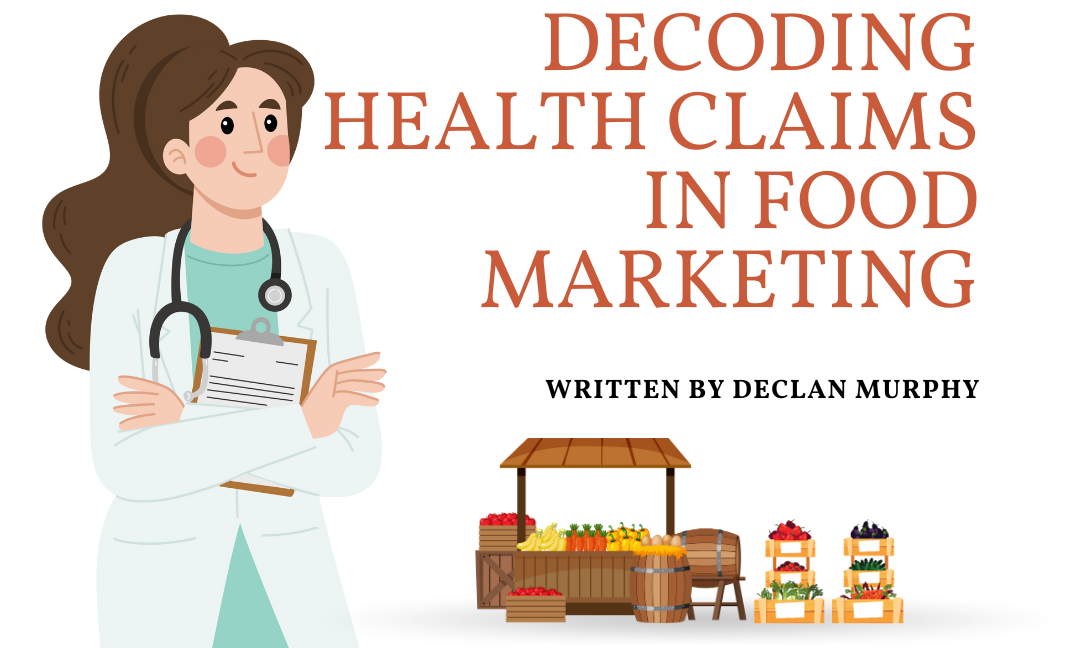DISCLAIMER: This post was researched and written by a high school volunteer; all opinions, claims, and conclusions contained within the below article are those of said volunteer and not necessarily reflective of the viewpoints of Seeds of Diversity / Youth in Food Systems and should not be taken as facts. Please refer to Sources (end of article) for more information.
Written by Declan Murphy
Edited by Julia Georgescu
Designed by Kiritika Rana
Published by Rayna Almas
Most of us want to eat healthy, but it’s sometimes hard to tell what is healthy and what’s not. This is made even more complicated by food marketing and its health claims, which can sometimes lead us to believe some foods are better for us than they are.
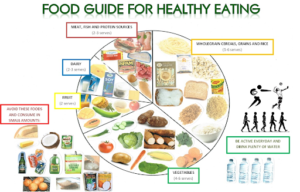
Studies have shown that having more information about health and nutrition can lead to healthier choices and healthier lives. However, misleading health and nutrition claims by food manufacturers can make people eat more of some things they should really limit. This is particularly true in regard to snack foods.
Let us compare the health and nutrition claims of two popular snack products: Lay’s Classic regular potato chips and Sensible Portions sea salt flavoured Garden Veggie Straws. While most of us would select Lay’s potato chips as the “unhealthy” snack between these two, is that really true? How would we know?
Sensible Portions clearly market their “veggie straws” as a relatively healthy alternative to potato chips and other popular snack foods, but are they?
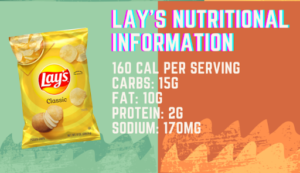
There are 160 calories in one 28-gram serving of Lay’s regular potato chips, with 37.5% of its calories (60) being from carbs, 56.6% (90) of these calories from fat, and only 5% (or about 8 calories) being from protein. Each serving contains 170 mg of sodium. The fact that more than 50% of its calories come from fat, and the relatively low nutritional value compared to its calories, means that this food is a “choose less often” food, rather than something that should be consumed regularly.
However, since potato chips are generally not considered “health food,” most informed consumers should probably understand this going in. Compared with our next product, Lay’s makes relatively few health claims about its product.
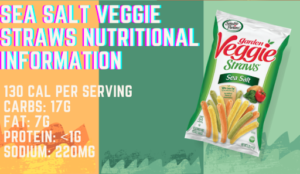
Sensible Portions makes several claims about their veggie straws, including their lack of artificial flavours or preservatives, as well as being gluten-free, which all seem to be accurate. They also claim to contain “30% less fat than the leading potato chip,” though no specific brand or type of potato chip is specified. Nevertheless, the veggie straws contain 7g of fat per portion, compared to the 10g of fat found in a serving of Lay’s Classic chips. A serving of veggie straws also contains 30 fewer calories than Lay’s Classic chips, which might make it seem like a healthier alternative, as well.
However, their use of the word “veggie” (as well as the inclusion of “garden” before veggie straws on the packaging) is likely meant to make you feel like you are eating something nutritious and healthy. These terms might make veggie straws seem more like real food than mere salty snack products. While they do contain beet, spinach and tomato pastes or powders, they contain no fiber and are primarily made with potato starch. This means that this snack is not comparable to snacking on plain vegetables.
Veggie straws also contain less protein than Lay’s chips, with only 3.07% (4 calories) of its calories coming from protein. Only 48.46% (63) come from fat, (though that is still a high percentage compared to other snack options), and 52.30% (68) of its calories come from carbohydrates. Veggie straws also contain 220 mg of sodium, 50 mg more than Lay’s, and exceed most recommended daily sodium intake values!
According to Healthline (2021), veggie straws are “not much different from other chips that are often criticized for their low nutritional value.”
The point here is not that we should eat Lay’s instead of veggie straws, or that Lay’s doesn’t come with consequences to one’s health. Rather that health claims made in the branding and marketing of veggie straws tend to obscure the fact that they are also a “sometimes food,” and not significantly better for our health than plain potato chips.
Health claims made in marketing campaigns, even when they are accurate, do not necessarily mean that a type of food is “healthy”. We should still read and compare the labels carefully to understand how to appropriately portion and limit them.
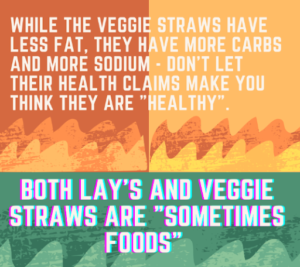
Awareness of food marketing is a vital blending of media literacy and food knowledge that can help you understand the ways in which branding and advertising influence eating habits and choices. These skills can help you be aware when you are being targeted by food marketing and can help you remember to rely on nutrition labels rather than advertisements. It can also help you guide younger children and other people who are particularly vulnerable to food marketing.
It can be difficult to make healthy decisions. Information seems to be constantly changing, and we are barraged with marketing claims that can be challenging to interpret. Whatever the packaging or advertisements say, we should read labels carefully to understand what they mean and apply the best information we have available to maintain a healthy diet.
Sources:
Charles Alexis, A. (October 14, 2021). Veggie Straws: Are They Healthy? Pros, Cons, Nutrition. Healthline.
Government of Canada. (2020). Healthy eating recommendations – Canada’s Food Guide
Government of Canada. (n.d.) Marketing can influence your food choices
Hanbor12. (2013.) File:Guide to Healthy Eating 2013.jpg – Wikimedia Commons
Lay’s. (2023.) LAY’S® Classic Potato Chips
Murphy, D. (2023.) Images: Original infographic images, making use from images taken from Veggie Straws – Sensible Portions and LAY’S® Classic Potato Chips.
Oostenbach, L. H., Slits, E., Robinson, E., & Sacks, G. (2019). Systematic review of the impact of nutrition claims related to fat, sugar and energy content on food choices and energy intake. BMC Public Health, 19(1), 1-11.
Sensible Portions. (2022). Veggie Straws – Sensible Portions
Valente, L. (February 16, 2021). Are Veggie Straws and Chips Healthier Than Potato Chips? EatingWell.

